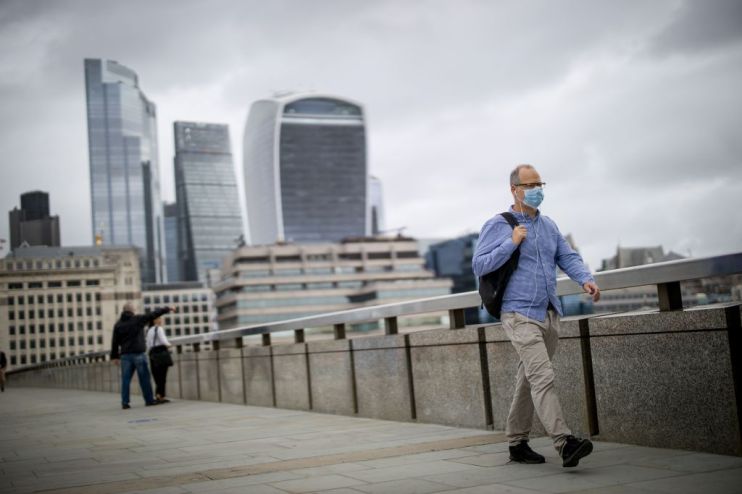FTSE 100 swings into the red as pound surges with US stocks mixed

The FTSE 100 stumbled as traders shrugged off Brexit worries to bid up the pound, while US stocks were mixed after the US and China signalled progress on trade.
London’s main stock index was 0.3 per cent lower at 6,088 points in afternoon trading, having dropped back after climbing more than one per cent. The FTSE 250 of mid-cap companies was down 0.2 per cent.
The blue-chip index was weighed down by the pound, which jumped 0.6 per cent to $1.314. A more expensive pound dents the value of FTSE 100 firms’ overseas earnings.
On Wall Street, the S&P 500 rose 0.1 per cent in early trading. But the Dow Jones and Nasdaq were down 0.1 per cent.
Read more: Moderna set to provide EU with 80m doses of coronavirus vaccine
Germany’s Dax was up 0.5 per cent and France’s CAC 40 was 0.9 per cent higher. The continent-wide Stoxx 600 was up 0.4 per cent.
The mixed mood followed a call between US and Chinese officials yesterday about trade. Reports said both parties see progress on some of the key issues surrounding the “phase one” trade deal struck in January.
China’s commerce ministry said after the call that there had been “constructive dialogue”. The US Treasury said that “both sides see progress”.
FTSE 100 choppy despite Europe’s rise
Market optimism initially pushed the FTSE 100 up for the second day after a stellar 1.7 per cent jump yesterday. However, it fell in afternoon trading as the pound climbed.
The pound was pushed up by a weaker dollar. The greenback slipped 0.3 per cent against a basket of other currencies. Seen as a “safe-haven asset”, it has fallen in recent months when stocks have risen.
UK drug giant Astrazeneca’s shares rose for the second day this week. This morning it started clinical trials of a drug to help treat and prevent coronavirus. The trials are separate from its work on a Covid vaccine with the University of Oxford.
Read more: Astrazeneca starts trial of Covid-19 antibody treatment
However, doubts about the UK’s economic recovery and rising coronavirus cases also weighed on the index.
Among the biggest fallers were building materials firm CRH and miner Anglo American, which both shed more than 1.8 per cent. ITV and British American Tobacco both dropped 1.5 per cent.
Dollar tumble pushes up pound
Traders shrugged off Brexit concerns, huge government borrowing and rising coronavirus cases to bid up the pound. It also rose 0.2 per cent against the euro to €1.11.
Connor Campbell, market analyst at trading platform Spreadex, said: “Investors were willing to look past the various issues attached to the pound.”
“This in turn spelled disaster for the FTSE, which swung from 6,175 to 6,090 despite its US and Eurozone peers holding onto their gains.”
Traders were also unfazed by a weaker than expected retail survey from CBI. It showed that British retailers have cut the most jobs since the depths of the financial crisis during the coronavirus pandemic.
Read more: Italy begins coronavirus vaccine trials as WHO chief urges global cooperation
The dollar remained stuck near two-year lows. “The US dollar continues to consolidate at lower levels against other G10 currencies as it has done throughout this month,” said MUFG currency analyst Lee Hardman.
Hardman said traders are looking towards this year’s online Jackson Hole central banking symposium. US Federal Reserve chair Jay Powell is due to speak on the economy.
US stocks keep hitting new highs
In European and American markets, there was also some residual optimism from yesterday’s session. The FTSE 100 rose sharply and US markets hit fresh all-time highs after US authorities gave the green light to a new coronavirus treatment.
“Lately, any pharma story that is trying to tackle the virus tends to get a positive reaction from traders,” said David Madden, market analyst at trading platform CMC Markets.
He said this was “even though the industry is notorious for successes and failures in terms of drugs”.
Germany’s Dax stock index was helped by a survey that showed business morale in the country picked up by more than expected in August.
“The German economy is on the road to recovery,” said Clemens Fuest, president of the Ifo Institute that released the survey.
Read more: German economy suffers record quarterly contraction
It came after data showed the German economy shrank by a record 9.7 per cent in the second quarter. However, the reading was better than an earlier estimate of a contraction of 10.1 per cent.
Neil Wilson, chief market analyst at Markets.com, said: “Risk sentiment remained robust after official figures showed Germany’s economy shrank less than previously thought.”